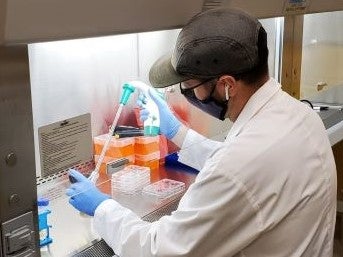Professor Marc Aucoin from the Department of Chemical Engineering is working with Professor Brian Dixon from the Department of Biology and Dr. Kevin Stinson of St. Mary’s General Hospital in Kitchener, Ontario, to explore antibody testing as a means to a safer and minimally disruptive return to normalcy as quarantine restrictions are lifted.
Using blood samples from a regional patient cohort, they are conducting a longterm study that involves a series of unique tests to collect information from the antibody markers that indicate a person’s immunity to the virus that causes COVID-19. Using enzyme-linked immunosorbent assays (ELISAs) that can detect SARS-CoV-2 specific antibodies in blood, they are investigating how long these antibodies stay in our bodies and whether the level of antibodies can be an indicator of disease progression.
Aucoin’s research group is producing the biological materials necessary for the ELISAs. PhD candidate Mark Bruder uses cell transfection to generate SARS-CoV-2 spike and receptor binding domain proteins. These antigenic parts of SARS-CoV-2 target the antibodies produced by patients exposed to SARS-CoV-2. PhD candidate Scott Boegel generates panels of potential interfering viruses that are used to validate the specificity of the assays. The viruses include seasonal coronaviruses, like Human Coronavirus 229E and Human Coronavirus OC43.
These time-consuming processes require patience and skill. It takes a week to prepare the cells, an entire morning to perform the cell transfection or infection, and then another five days before the proteins or virus can be harvested. The process can be complicated because, as Professor Aucoin explains, “Cells are sometimes like grade school kids – they don’t always behave like we want them to. This is where the art of cell culture comes into play.”

Phd candidate Mark Bruder generates SARS-CoV-2 spike and receptor binding domain proteins in the Aucoin Research Group lab.
The researchers will have many more opportunities to perfect their art of cell culture. Future plans include looking at how mutations in the virus could evade the body’s immune response.
They will also explore whether antibodies generated from patients exposed to SARS-CoV-2 can be used to inform rational virus-like particle design. Virus-like particles are artificial, non-replicating particles that look similar to the SARS-CoV-2 virus, which could be used in developing a potential vaccine.
For more information, read The tell-tale sign of antibodies at Waterloo Stories.
This work on antibody testing complements Professor Aucoin’s ongoing efforts to design a SARS-CoV-2 vaccine, which you can read about here.